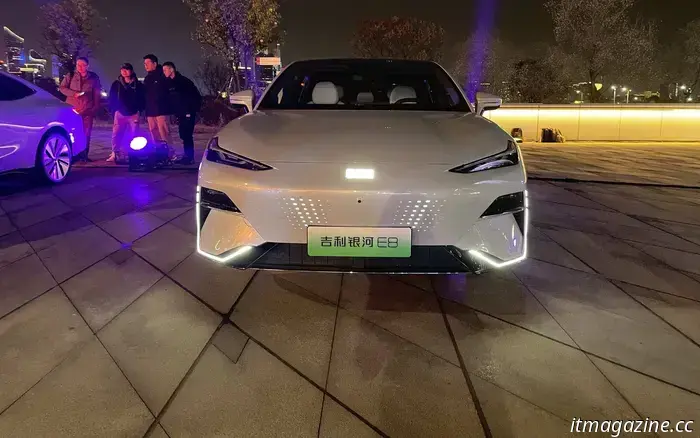
China's Geely accelerates its electric vehicle launch efforts to compete with leader BYD.
A Galaxy E8 was showcased outside the Lotus Olympic Center in Hangzhou, the eastern city where Geely is based, on January 5, 2024. Credit: TechNode/Jill Shen
Geely, a leading Chinese automotive manufacturer, plans to introduce four new electric vehicles in its domestic market before the year's end, aiming to boost sales and profits while seeking to narrow the gap with industry frontrunner BYD, as discussed by executives during an earnings conference on Thursday. Geely intends to begin accepting orders for its Galaxy M9 plug-in hybrid electric vehicle (PHEV) on August 23, followed by the launch of the Lynk & Co 10 EM-P, a PHEV version of its Z10 sedan, next month, according to the company's CEO Jerry Gan Jiayue. Additionally, the Zeekr 9X, the inaugural hybrid model from Geely's premium brand Zeekr, is expected to hit the market in September or October, while the Galaxy Xingyao 6 sports sedan is set for release in the last quarter of this year.
The company's market share in China topped 10% for the first time in the first half of this year, placing it just 4% behind the leading automobile seller, BYD, as noted by Geely Auto's executive president Gui Shengyue. Gui stated that Geely aims to address “some gaps” in the new energy vehicle sectors to catch up with, and potentially surpass, the industry leader.
On Thursday, Geely, the foremost manufacturer of internal combustion engine vehicles and the second-largest electric vehicle producer in China, announced solid growth for the first half of 2025, with revenues reaching RMB 150.3 billion ($21 billion), a 27% increase compared to the previous year. This growth was primarily driven by the success of its mainstream Galaxy lineup, which saw sales surge to 548,000 cars from January to June, compared to just 81,400 units during the same period last year.
Nonetheless, the automaker experienced a 14% decline in earnings, reporting a net profit of RMB 9.3 billion, or RMB 90.3 per diluted share, down from RMB 10.8 billion, or RMB 105.8 per diluted share, a year earlier. Geely Auto's average selling price fell by 13% year-on-year to RMB 96,000. The firm's Galaxy E5 crossover competes directly with BYD’s Yuan in the entry-level market, while the small electric vehicle Geely Xingyuan takes on BYD’s Seagull hatchback, both starting at prices below RMB 70,000.
Geely’s premium Zeekr brand had stagnant sales of around 91,000 units during the same timeframe, reflecting a mere 3% year-on-year growth. On July 15, Geely Auto announced a merger agreement with Zeekr, planning to acquire the remaining shares it does not already own, with the completion of the deal expected in the fourth quarter. Zeekr had previously taken control of Lynk & Co, another Geely-supported brand, late last year. This consolidation is anticipated to generate synergies and lower costs once Zeekr and Lynk & Co are fully integrated.
Analysts at Citic Securities predict that the upcoming Zeekr 9X launch will assist the company in moving upmarket and improving margins in the latter half of this year, with monthly sales for the Galaxy lineup potentially reaching 150,000 units. Gui reported that over 30,000 customers have converted their reservations into orders for the recently launched Galaxy A7 hybrid sedan, which debuted a week ago with a starting price of RMB 81,800.
Jill Shen is a Shanghai-based technology reporter covering Chinese mobility, autonomous vehicles, and electric cars. Connect with her via email: [email protected] or on Twitter: @jill_shen_sh. More from Jill Shen.

China's Geely accelerates its electric vehicle launch efforts to compete with leader BYD.
In the first half of this year, the company's market share in China exceeded 10% for the first time, placing it just 4% behind the leading automobile seller in the country, BYD.

